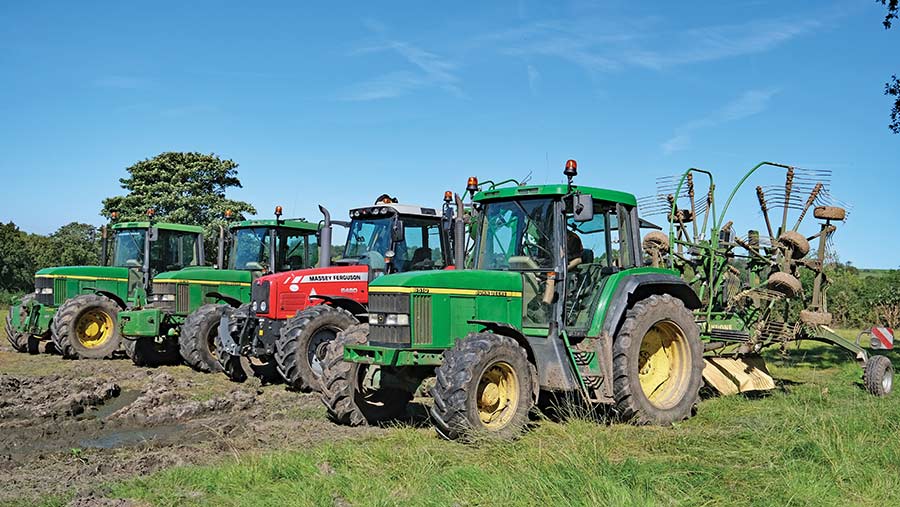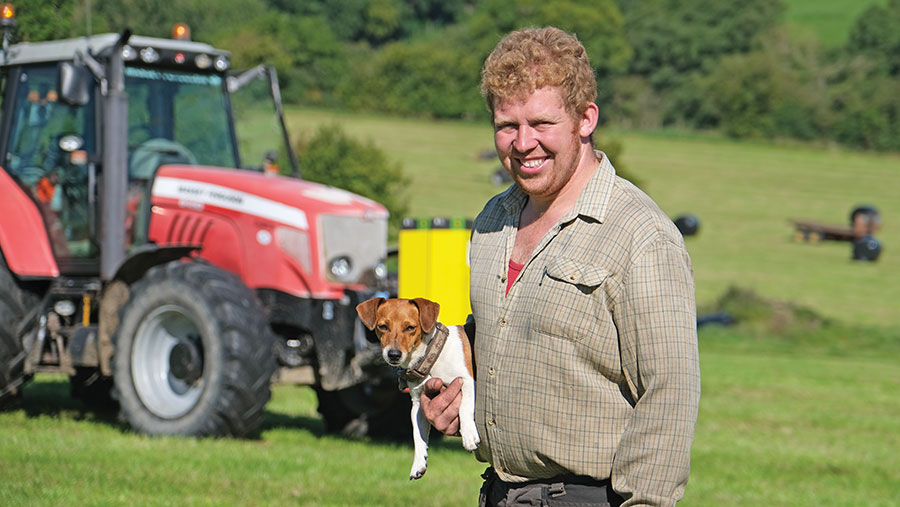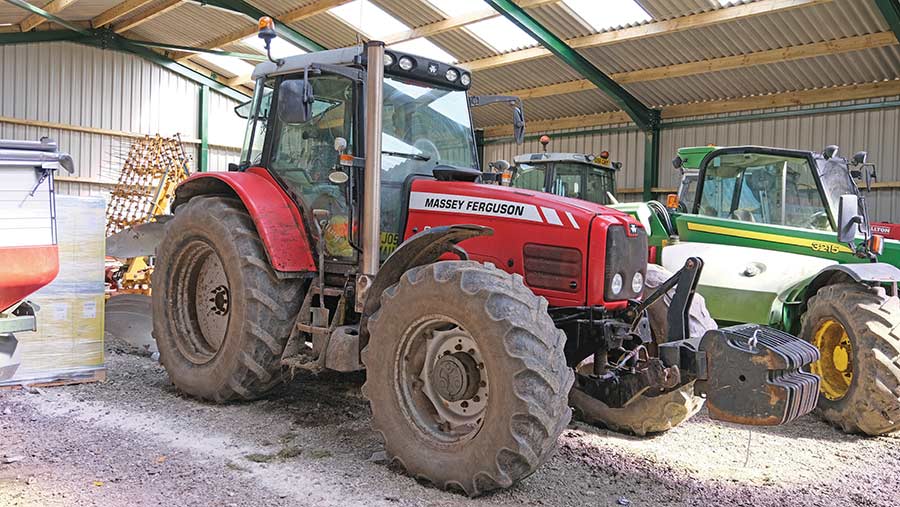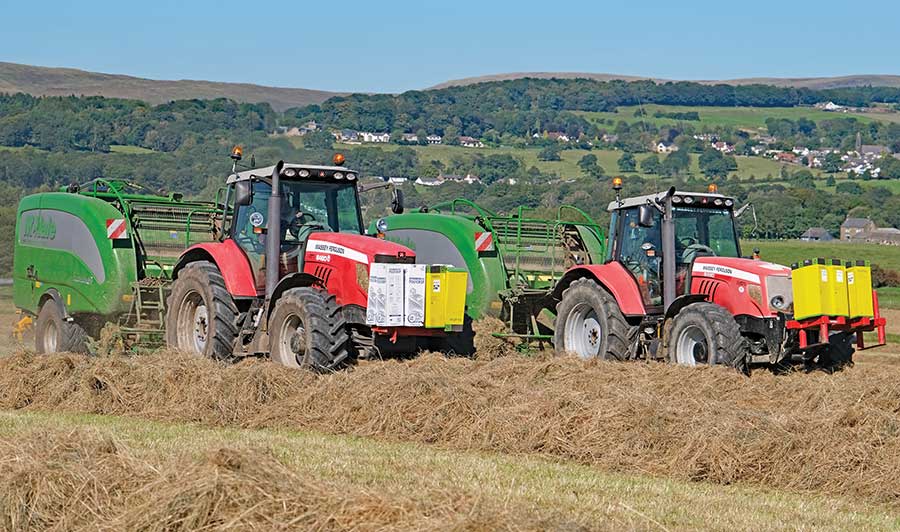Why a Lancs contractor runs 14-strong fleet of older tractors
 © James Andrews
© James Andrews Choosing whether to splash out on swish new tractors or save cash by running higher-hour machines has long been a quandary for agricultural contractors.
Lower risk of breakdowns, access to the latest tech and the reassurance of a warranty are all ticks for the buy-it-new fraternity.
But for those willing to take a gamble on the second-hand market there can be some welcome financial relief.
Blackburn-based operator Harry Shaw falls firmly into the latter category.
Together with his father, Jason, he runs a 14-strong fleet of 1990s and 2000s machines, most of which were purchased when the newness had long worn off.
“We’ve never seen the point of tying up huge amounts of money in the latest tractors, as it’s the kit on the back that brings in the money,” says Harry.
See also: North Yorks farm’s six Fendt tractors clock up 97,000 hours

Harry Shaw and Slurry the Jack Russell © James Andrews
For this reason, the cash saved on the power up front goes towards buying most implements brand new, such as a brace of McHale Fusion 3 baler-wrappers, Kverneland front-and-rear mower conditioners and an Abbey slurry tanker.
When selecting suitable used workhorses, value for money is top of their agenda.
This is why four of the frontline machines are six-cylinder Perkins-powered Massey Ferguson 6480s.
Most of these they’ve picked up for less than £30,000 on sensible hours and, with at least 140hp on tap, they are capable of taking on any task they require.
On the pair’s livestock-oriented contracting enterprise this can range from mowing, round baling and trailed forage harvesting to umbilical slurry pumping, lime spreading and ploughing.
Other pluses for the 6480s are the fact they’re nice to drive, simple to maintain and reliable.
Engines have not given the Shaws any significant trouble and they’ve never had to delve into a transmission.
This is undoubtedly helped by the fact that they’re fastidious about maintenance, changing engine oil and filters religiously every 250 hours, and employing the services of independent mechanics Gav Collinson and Kevin Middleton of Middleton Tractors, who keep the fleet running at its best.
Another contributor is the fact that there are just the two of them working in the business full time and a handful of part-timers, meaning the workload on each machine is minimal.
With far more tractors than drivers, they never have to worry about breakdowns either, as there’s always another waiting in the wings.
18,000-hour machine
The tractor that paved the way for their other 6480s to follow is an early 2005 model with a Dynashift transmission.
This has a manual range change with four powershift steps, unlike the later Dyna-6 tractors, which have six powershifts and robotised range changes, all carried out using a single T-shaped shifter.
Harry bought the tractor when it was on just 3,300 hours and, in the 11 years it’s been with them, it has worked its way up to 18,000.
“It’s been a hell of a tractor. It started off at about 140hp, but the more hours it does, the more it seems to open itself up – I had it on a dyno recently and it was putting out 170hp at the pto.”
This power hike has been entirely self-administered as the Shaws have never been ones for chipping or remapping tractors.
“You never know quite how it’s going to affect them in the long run, so we tend to play it safe and keep them standard.”
Harry Shaw’s tractors
Massey Ferguson
- 2005 6480 Tier 2 Dynashift – 18,000 hours
- 2006 6480 Tier 2 Dyna-6 – 6,500 hours
- 2006 6480 Tier 2 Dyna-6 – 7,500 hours
- 2008 6480 Tier 3 Dyna-6 – 6,600 hours
- 2006 6490 Tier 2 Dyna-6 – 7,500 hours
- 2006 6465 Tier 2 Dyna-6 – 8,000 hours
- 1998 3125 – 13,000 hours
- 1996 399 – 7,800 hours
- 1974 165 – 16,000 hours
- 1961 35 – unknown hours
John Deere
- 1999 6910 – 5,500 hours
- 2001 6810 – 14,000 hours
- 2002 6510 turbo – 13,000 hours
- 2000 6510 – 12,500 hours
6480 weaknesses
Like all tractors, the 6480s have a few gremlins which, having run the 2005 tractor for so long, they know to look out for.
As soon as they reach 5,000 hours they get the brakes done, as the last thing they want is them breaking up and going around the whole back end.
Come 8,000 hours, the pto bearings get changed as, if they fail, they can cause the clutch pack to slip and wear out.
While they’re at it, they change the hydraulic pump, as these tend to be getting tired by this point.
Failed water pumps are a more regular problem and the 2005 tractor has been the worst affected, receiving seven new ones in its tenure.
It’s also had a new clutch and the damper plate that sits between the engine and transmission has been replaced.
“We’ve had to do a few things to it over the years, but most of it I would put down to wear and tear.”
Two of the other 6480s are 2006 Tier 2 models with Dyna-6 transmissions, which have worked 6,500 and 6,600 hours apiece.
Like the older Dynashift model, these have a top speed of 40kph, which Harry prefers to the faster 50kph option.
“The extra speed is handy when you’ve got to go a long way, but it’s amazing how much extra wear it puts on the tractor.
“For that reason, I’m generally happy to take things a little slower.”
One tractor has also developed a crack in the ECU, which was initially repaired by David King Electronics. However, it’s now packed up again and is awaiting a replacement.

MF 6480 Tier 2 © James Andrews
Tier 3 tractor
The latest Tier 3 tractor is the only one to have the faster transmission. This is the newest the Shaws have and was the most expensive at about £35,000. But, ironically, it’s the one with the most faded paintwork.
It’s remarkably similar to the Tier 2 tractors underneath the bodywork and is still fitted with a Perkins engine rather than the later Sisu.
However, it’s heavier and has a slightly longer chassis.
“You really notice this when using a Fusion baler on the banks as it’s a lot more stable,” says Harry.
Other Massey Ferguson models in their ownership include a larger-frame 6490 powered by a 6.6-litre Sisu six-cylinder engine, which is good for about 180hp.
They don’t find it as handy as the 6480s, but it is well teamed with the Fusion baler.
There’s also a 6465, which spends most of its time saddled with a mounted sprayer, a 3125 that doesn’t do much work these days, a 399 with a loader, a 165 that runs a straw bedder at their home farm and a 35 that is hooked to a muckscraper.

MF6480 and 6490 © James Andrews
1990s John Deeres
It’s not just Massey Ferguson tractors that make it into the Shaw fleet, with four 6010-series John Deeres rounding off the collection.
Although values for these tractors are rising, Harry has managed to find them for reasonable money, and they’re still capable of putting in a decent shift.
The most recent 10-series purchase is a tidy 6910 which he bought for £25,000 on just 5,000 hours.
This mucks in as a bit of an all-rounder, but because it’s the most valuable of the Deeres it doesn’t get a particularly tough time.
A far harder-worked machine is their 14,000-hour 6810, which has spent a lot of its time running a hedgecutter. The same can be said for their pair of six-cylinder 6510s, one of which was retrofitted with a turbo.
“They’re both great tractors, but the drivers tend to hop on the standard non-turbo tractor first. It’s surprising how much power and torque it’s got, so much so that we have used it on our 2,700gal Abbey tanker.”
Next purchases
Harry is constantly on the hunt for new good-value tractors, but tidy Tier 2 and 3 Perkins-powered 6480s on low hours are getting harder to find.
For this reason, he’s broadening his search to include Valtra and Claas. He recently had a high-horsepower four-cylinder N174 out on test from the aforementioned maker, but found it gutless at low revs on the baler.
He also tried a Claas Arion and has a six-cylinder T-series Valtra being sent out to try. “I like to keep my options open, but there’s every chance the next tractor will be another 6480. I just might have to increase my budget a bit.”

